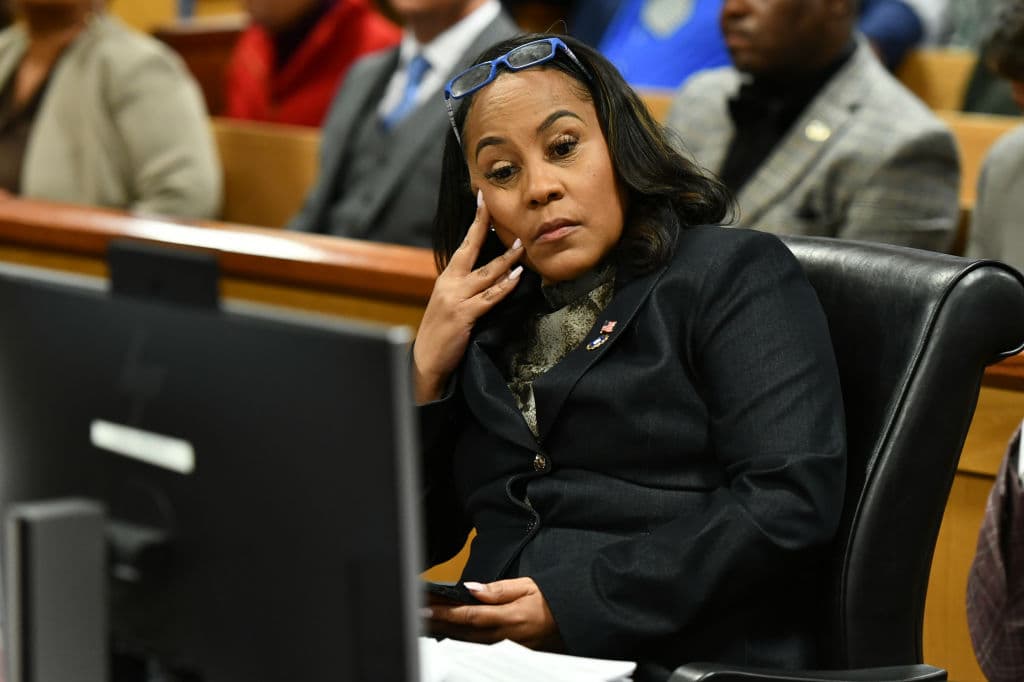Fani Willis’s Prosecution of Trump While He Is President Could Lead to a Constitutional Crisis
The Supreme Court has never ruled on whether a state prosecutor can pursue a sitting president.

President Biden’s pardon of his son Hunter underscores the awesome reach of presidential power — but also its limitations when it comes to state prosecutions like the one President Trump faces at Fulton County.
The district attorney of that Georgia county, Fani Willis, has been mum since the election on the fate of her sprawling racketeering case against Trump and 18 others. She earlier declared that “the train is coming” to convict Trump, notwithstanding the effort to disqualify her for her secret romance with her handpicked special prosecutor, Nathan Wade. She also accused her foes of “playing the race card.”
A hearing on those issues set for this week before the Georgia court of appeals was canceled, but for now Ms. Willis still leads the election interference case. She is not bound by Special Counsel Jack Smith’s decision to dismiss his cases after the Department of Justice’s Office of Legal Counsel determined that there is a “categorical” prohibition on prosecuting a sitting president.
Mr. Smith acknowledged that the OLC decision is “binding” on him because of the power delegated by the attorney general to that office. The OLC’s position, though, does not extend to state prosecutors — it does not even carry the weight of, say, a Supreme Court decision. Even Mr. Smith characterized the impediments to his prosecutions of Trump as “temporary” and attributable to “circumstances” rather than the “merits” of the case.
If Ms. Willis presses her case beyond Trump’s inauguration, the 47th president could be limited in his ability to halt her efforts. That could lead to a constitutional crisis. The Constitution ordains that the president “shall have Power to grant Reprieves and Pardons for Offences against the United States.” In 1886 the Supreme Court held that the power is “unlimited” except in cases of impeachment and extends to “every offence known to the law.”
In 1925, though, the high court determined that “the pardon of the President was to operate upon offenses against the United States as distinguished from offenses against the states.” The justices based that interpretation on the addition, at the Constitutional Convention, to an original draft of the words “for offenses against the United States.” That edit was undertaken by a “Committee on Style” that comprised Alexander Hamilton and James Madison.
A legal scholar, Joshua Blackman, tells the Sun that Ms. Willis could argue that her case ought to continue because it is still so far from trial that its continuation could not harm what Justice Antonin Scalia called “the boldness of the president” or his ability fulfill his constitutional duty to “take Care that the Laws be faithfully executed.” That mandate would appear to be more threatened by, say, the sentencing in District Attorney Alvin Bragg’s hush money case, which carries the possibility of a stretch in prison.
Yet the logic behind the halt in Mr. Smith’s prosecutions — that a sitting president requires immunity so that he can perform his job — could apply to state prosecutions, just as the Supreme Court’s immunity ruling in Trump v. United States holds for both state and federal prosecutions. If Ms. Willis’s case ever gets to trial, she would have to show how the evidence she adduced comports with the ruling of Trump that official presidential acts are presumptively immune.
Trump’s first address to stop Georgia’s case against him is likely to be the Georgia supreme court, the Peach State’s highest judicial authority. It could order the charges dismissed entirely or stayed while Trump serves his second term.
Another legal scholar, Alan Dershowitz, tells the Sun that he “doesn’t know how the law operates in the wilds of Georgia,” especially given that Ms. Willis could have lied under oath during her disqualification hearings before Judge Scott McAfee. The judge claimed that her behavior exhibited an “odor of mendacity” and a “significant appearance of impropriety.”
If the Georgia supreme court rules against Ms. Willis — or for her — either party could appeal to the United States Supreme Court by averring that there are federal issues at stake. Mr. Dershowitz reckons that while there is no “direct law on whether a sitting president can be prosecuted by a state,” the Constitution’s Supremacy Clause, which ordains that federal law is part of “the supreme law of the land,” mandates that Ms. Willis’s case at least be paused while Trump is in office.
Taking her prosecution to the Supreme Court could be a risk for Ms. Willis, though. Mr. Blackman tells us that such a case — call it Trump v. Georgia — could result in a sweeping prohibition against states prosecuting sitting presidents. In much the same way that Mr. Smith’s prosecution of Trump yielded the sweeping grant of immunity in Trump, Ms. Willis’s insistence could backfire into even more presidential protection.
A state prosecution of a high constitutional officer has been contemplated before. In 1804 the sitting vice president, Aaron Burr, shot and killed Alexander Hamilton in a duel at Weehawken, New Jersey. Burr was charged with murder in both New York and New Jersey, but neither of those cases ever reached trial. The indictment in New Jersey was quashed by a state court. In any event, Burr was replaced as vice president the following year.
In 1807, Burr was acquitted of federal charges of treason in a plot unrelated to the duel.

